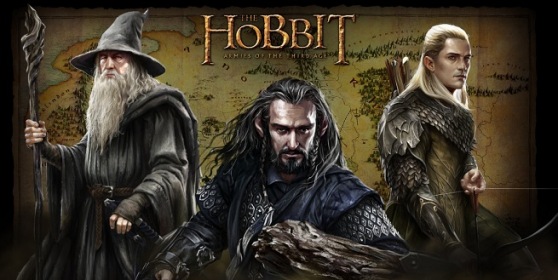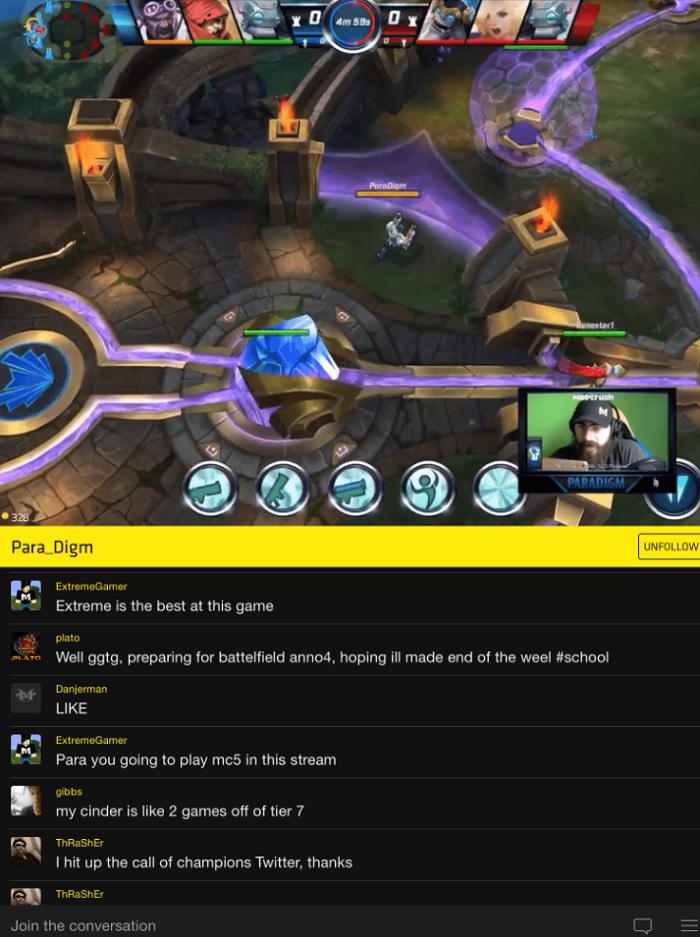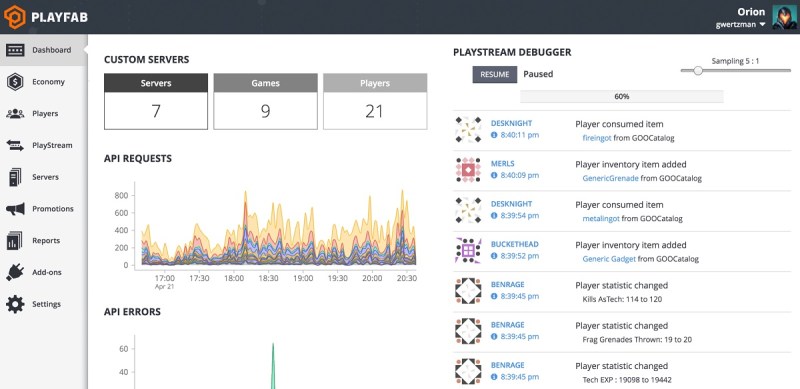You can think of Chris Carvalho as a game company accelerator. He started at mobile game company Kabam when it had just 25 people. When he left two years ago, the company had more than 700 people. It went from $2 million in revenue to more than $360 million.
Now he’s carved out a niche as an adviser for game startups. He is on the advisory board of Jump Ramp Games, Roblox, MaxPlay, PlayFab, and Mobcrush. He tells them how to read the tea leaves of the industry and find a path to growth. He even advised his 15-year-old son on how to launch his first mobile game.
We talked to Carvalho about the kind of advice he’s giving his clients these days as the game industry goes through a lot of changes. Here’s an edited transcript of our interview.

Above: The Hobbit
GamesBeat: What’s your focus these days?
AI Weekly
The must-read newsletter for AI and Big Data industry written by Khari Johnson, Kyle Wiggers, and Seth Colaner.
Included with VentureBeat Insider and VentureBeat VIP memberships.
Chris Carvalho: I’m focusing on a lot of things since stepping down as COO of Kabam. In the last two years I’ve worked with a number of startups. I’m on the board of three startups and just joined the advisory board of Jump Ramp Games, which I’m excited about.
They have a new take on something tried and true — not in traditional gaming, but in interactions and meta-interactions. If you go back to the ‘50s, sweepstakes have always been very powerful with a certain segment of the population. That’s now migrated — through Jump Ramp’s first app, Lucktastic — into a digital world. They’re marrying the same mechanics that have worked in the physical world with things that are working digitally and offering incredible value. They’re giving away $1 million to an individual as part of their sweepstakes.
The company has been around for several years. I got interested in them after talking to them about the overall concept, but just as important, about the business and how they think about the business. What excited me about them is they had many of the same attributes we had at Kabam in the early days — a high business acumen and use of business intelligence to not only improve gameplay, but to offer incredible value to different brands.

Above: Jump Ramp Games
GamesBeat: Is that on the border of gaming? How would you view that as far as where it lies?
Carvalho: If you drew a Venn diagram, it’s certainly not all in gaming. There are game aspects to it. As they propel into the future you’re going to see more engagement-type game mechanics that will be part of their app. That’s exciting. They’re carving out a niche no one else is moving into.
It’s similar to when people took physical card games and things like that to a digital realm. There are some nice little overlaps. As you go forward you’ll see those overlaps get larger.
GamesBeat: What are the other boards you’re on?
Carvalho: I’m on Roblox, which I think you’re somewhat familiar with. They’re the largest gaming platform for teens and kids, larger as a destination than Disney or any other significant brand. They have more than 20 million uniques a month. They’re growing fantastically. They’ve launched on desktop and mobile. Most recently they launched on Xbox.
You’ve probably met with the Maxplay guys. They’re building out a core game engine that’s hopefully going to drive more collaboration, enable more collaboration as you’re building games. It has more performance runtime value than the legacy engines. Especially sitting on the precipice of VR, they’re poised to take advantage as more game developers start looking at that medium and trying to develop new projects.
GamesBeat: And Mobcrush is interesting as well.
Carvalho: Yeah, I’m an investor in Mobcrush and an advisor to Royce. I’m excited about them coming out of beta shortly. PlayFab is another tools company. James Gwertzman in Seattle is trying to create some backend tools and technology that can help drive monetization, especially in live ops.
When you look at where gaming is going, especially mobile gaming, where there’s starting to be a bit of consolidation — we’ll see that going forward. It’ll be interesting to see how all that shakes together. It’ll also be interesting from Jump Ramp’s perspective as far as how having a niche, partial gaming, instant rewards type of app plays into this ecosystem.
GamesBeat: Are you doing more advising or more investing? If you’re doing investing, what’s your approach there?
Carvalho: I’m mostly focused on advising. I’ve made a few investments, and if something else pops up that I think has the power to be disruptive, I’d certainly take a look at making an investment. But for the most part I’m looking to help companies accelerate themselves to scale.
The sweet spot of my role at Kabam — I was the first executive who came on. I became COO when there were 25 guys there. I helped us accelerate over those four years to more than 700 people, from $2 million in revenue to $360 million. For myself, the companies I can add the most value to are companies like Roblox and Jump Ramp. They’ve reached a scale. They’ve figured out how to monetize. Now they want to know how to take this to the next level.
GamesBeat: What is some of that advice? If mobile has become as difficult as some people say it is, what are the right paths for these companies to follow?
Carvalho: It all depends on each company. I haven’t been a specific advisor for a developer. For developers it’s a different situation. It’s a very difficult time to raise money if you’re a game developer. It’s difficult to find users for your games. Discover continues to be a huge issue. Because the top players are driving CPIs up, it’s very hard to get the wind at your back and get going. You find so many companies that are hoping they’ll be featured by Apple or Google. That’s not a good strategy. You can’t base a company on, “Let’s put all this hard work in and hope we get featured.”
The other companies I’m working with, a lot of them are B-to-B plays that either help companies monetize, or in the case of Roblox, that’s a platform. They don’t have to build around one game. Jump Ramp has a very unique DNA, if you will. They’re able to scale and not be as directly competitive with gaming companies.
When I come on I work with the CEO and the C-team and talk about their plans and how to grow the business. We’ll talk about different ways to grow. We talk about not only how to scale revenue, but how to scale all the different frameworks and parts of the business you need to understand in order to ensure that your growth is at the proper pace and economically viable.

Above: Mobcrush
One of the strengths of Kabam over all those years was we were analytical and focused on where the key metrics and KPIs were that would drive the business. How can we strictly work on those and look at those and develop new frameworks for thinking about how the monetization of a game is working, how the marketing of the game is working, and so on. Companies that are, in essence, more analytical and focused on driving lifetime value out of their users and understanding what will engage them, what they will be willing to pay for in premium content—That’s incredible important. Constantly understanding your customer is always foremost in mind with any of these companies I work with.
GamesBeat: Roblox is standing out from the norm in that they have user-generated content and a platform that could be used for more than one thing. Does that sum it up?
Carvalho: Absolutely. The big difference between Roblox and a traditional developer is that Roblox is a platform. They have thousands of user-generated games. If any one or two or 10 or 50 decide to take off, it’s not going to impact the overall business. Their business is allowing kids and teens to imagine and play in a fun-filled environment that’s more social, with these games as a backdrop of things to do. It’s a great way to interact socially with your friends or to meet others.
What’s coming next for them — everyone else is talking about VR. Roblox will have some interesting things coming up shortly that they’ll be able to dive in deeper on.
GamesBeat: When you’re investing, are you doing it through a firm, or just on your own?
Carvalho: I’m on my own.
GamesBeat: Are you also involved in any kind of angel thing?
Carvalho: No. I have a core group of guys that have invested significantly, so I talk to them and they’ll talk to me if there’s something that pops up and I’ll take a look at different things. But that’s not the core of what I’m looking at now. If things pop up and make sense I’m happy to jump in, but the value I provide to startups in general as an adviser who’s been through a massive scaling of a company — many founders have found that a valuable proposition.
GamesBeat: Have you watched some companies mess that up?
Carvalho: The number one thing companies do wrong is they try to do too much. When things are going very well with a company, there’s always an issue of focus. There’s always some new bright shiny object that comes along. The life of a startup is a roller coaster. One day you’re down and the next day everything looks amazing, whether or not any outward experience of the business has really changed.
Because of that, a lot of times people are just thinking, “What if we do this? What if we do that?” There’s only so much you can do. You need to focus on the key levers that are going to move the business for you. That’s one of the hardest things. There’s limited information on what a new opportunity might be, the potential of it, and limited information on how much it’s going to distract your team if you take that on.
That’s the biggest learning. I talk about it almost every time I meet with someone. They’ll be excited about something new, and in some cases maybe it’s the absolute right thing to jump into, but in a lot of cases it’s something they should put in their back pocket for six months while they continue to focus and drive on the business levers they’ve established to date.
GamesBeat: If you look at the environment startups are heading into, how do you figure out what matters right now?
Carvalho: I assume you’re talking about a potential economic downturn. I’ve written about this a little on LinkedIn. The number of investments in startups has definitely declined, whether it’s quarter over quarter or month over month, from a year ago. The last I saw was that from last February, the number of deals was down 25 percent.
That reinforces what I first talked about. One of the learning is that you absolutely can’t try to do too much. As a startup you have a fixed amount of runway. You can’t necessarily be confident that you’re going to get the next round of funding, even if you hit the milestones you laid out that are crucial for that funding round. Silicon Valley is driven by fear and greed. We’re creeping into more of the fear environment now. It makes for a much higher bar as far as securing additional financing. You have to be overly focused on, “Hey, let’s ensure that we get X-Y-Z done and not try to take on more things that might limit our runway.”
GamesBeat: What about the VR market? Do you see that as diverting some attention away from other categories of games, like mobile?
Carvalho: We’ll see something very similar to what we saw at the start of mobile. Some new companies will pop up that are first out with an amazing experience that no one else has. There’ll be some runaway winners that we haven’t heard of just yet. That’s partly driven by—Until VR has enough overall users, it’s not a big enough marketplace for a big company to spend a lot of effort. Most companies will have something they play around with to do some testing, but because there’s not a huge opportunity just yet, what’ll probably happen is a company we haven’t heard of will jump out and seize the initiative and go from there.
It’ll be very different from taking off in mobile or the early days of Facebook, though, for one big reason. It takes goggles to pass Go. Whether you’re talking about VR for mobile or something tethered to your PC, in either case, if you look back on the history of how technologies have ramped, like DVD, it took six years for DVD to go from zero to 75 percent of American households. That was with all the content available from 75 years of filmmaking at the time. It all just had to be digitized. In this case you can’t just remake a game and throw it in VR. You have to make something from scratch.
The VR story is going to be told over the next four or five years. It’s not going to be a giant leap forward in 2017. It’ll be told in three, four, five years as the number of households and users that can enjoy it grows.
GamesBeat: How do you look at international growth markets now — going into China and other countries?
Carvalho: Kabam’s about to do something very interesting with Marvel Contest of Champions. They’ve had an amazing game that’s done very well in the west. They’ve made some investments to take the game to China and do it right, ensuring it’s a good fit there.
In general, companies have not made that investment. It’s been hard to translate gameplay — not just translating the words, but culturalizing the game and making it successful. Very few games have succeeded in both the western and eastern markets. That will continue to be the case unless companies make significant investments in understanding the specific markets they go into, the differences there and how games need to be updated to accommodate those differences.

Above: Playfab’s analytics screen.
GamesBeat: Do any other regions of the world sound interesting yet, as far as U.S. startups expanding abroad?
Carvalho: The easy things are always going, “Hey, we’re successful with an English-language game. Let’s take that to French, Italian, German, Spanish.” Then you have a good play in Europe. Beyond that, when you look at where at monetization is, you look at a country’s GDP. How does that GDP compare to a base level? You can gauge how a game will do based on the GDP.
Some companies have done fairly well in Russia. Turkey has done decently. But in the end it’s probably the 80/20 rule. If you just focus on western Europe in particular, you’ll get the most benefit. The emerging markets after that require much more work to ensure that the game will work there, that users will find it works culturally. It’s always harder there. Past that you would look at Asia, but again, taking a game to Asia involves a lot of work to make it resonate.
GamesBeat: How do you feel about the console market?
Carvalho: It’ll be interesting, later in the year, to see what Sony’s doing with VR. Will that be something that takes the market a step up?
GamesBeat: How much are you interested in outside of games? Have you ever considered moving out of games altogether?
Carvalho: I was blessed to work at both Lucasfilm and Kabam. Anything in consumer tech is interesting to me. I’m on the board of a wearable company called Performance Labs. They’re enabling virtual coaching. Any consumer tech play that has a potential effect on millions or tens of millions of users — a lot of the business aspects there are similar to what we did at Kabam.
GamesBeat: I’m curious where you think some of the most interesting companies are coming from these days. How do you look at Silicon Valley or Seattle or places overseas?
Carvalho: It’s definitely not just companies based in Silicon Valley. We’re seeing more traction in Los Angeles, a lot of good entrepreneurs. Mobcrush is one example. Some of the different companies I’m working with, whether it’s PlayFab in Seattle or Jump Ramp in New York, there are other areas where companies are starting to rise up. If Jump Ramp were a Silicon Valley company, maybe they would have raised more money sooner given where they are in the marketplace and the success they’ve had to date. But they’ve done a great job of growing the company to where it is and getting talent that will fit the bill.

Above: Flappy Sumo
GamesBeat: I was going to ask about your son’s game, Flappy Sumo. How did that come up again?
Carvalho: I was really proud of him. He learned how to code all on his own and he loved the original Flappy Bird. He wanted to do something similar to that and have some fun with it, so he put a sumo wrestler in. The fun part is, we can look at the stats and see that it’s been played on three continents. It’s a simple but engaging game. When people get into it they have some fun. I couldn’t be prouder. He did an amazing job. It just went live on Apple’s store last Thursday.
GamesBeat: Did you wind up giving him any advice on that?
Carvalho: I certainly didn’t give any coding advice. Otherwise it would never have come out. But I did talk to him about using Facebook, using his own accounts to promote it. He’s joined some groups on LinkedIn to promote it that way as well. We’ll see how it goes. He just did it for the fun of making a game. There’s no monetization in it. But he’s having fun learning all about it.
GamesBeat: He needs to get to know some YouTubers.
Carvalho: Yeah, get acquainted with some people. People have reached out to me to congratulate him and I’ve connected him with a couple who wanted to talk to him. He’s excited. He wants to find an internship this summer and push on and see where this will take him.
GamesBeat: On that front of user acquisition and all that, YouTubers do seem very influential these days. Likewise the Twitch live streamers. Do you have any advice for game companies that have to somehow get used to this new set of influencers?
Carvalho: I wouldn’t exactly say that they have to get used to it. They should embrace it and figure out how to leverage the power of these people who want to talk about their games. It’s an amazing thing. I’m a big sports fan. Think back to the ‘50s or so, when sports teams would say, “Okay, we’ll reluctantly televise some games, but we only want to show a few and we only don’t to show them locally so we don’t cannibalize our business.”
Having all these outlets talking about your game is absolutely going to inject new life and new users into your game. My advice is, how do you channel these people and give them what they need to have fun and talk about your game in such a way that you can promote your titles? This is ground-breaking. It didn’t exist at all if you go back three or four years. You can channel it, not only for acquiring new users, but also—If someone’s passionate about something they constantly seek out more information. Whether it’s guys on Twitch or Mobcrush or whatever that are talking about a game, it’s a great thing. Game companies should figure out ways to help them do their job, because it’s going to help your overall brand.
GamesBeat: Is there anything else around the industry that’s on your mind?
Carvalho: It’ll be interesting to see how esports shakes out. Anyone who’s so passionate about a particular game that they’re willing to watch people play it — if people like that are willing to be so engaged, there will be a lot more content around esports and a lot more opportunities around esports. There will be an ESPN of esports. But there will be multiple flavors. ESPN itself is doing something, but you’ll also see a Bleacher Report take or an SB Nation take. Bloggers will follow individual teams every single day. More and more information, analytics, that sort of thing. I don’t think esports is going to be a massive thing where everyone is involved, but it’s a significant market opportunity for a number of startups.
GamesBeat: I saw Clinton Foy and some other folks are investing in an esports team as a cross-platform brand, which was interesting.
Carvalho: They’re probably thinking that they’ve found the next Golden State Warriors, and they’re off and running.

Above: Jump Ramp Games
GamesBeat: Do you see Jump Ramp as something that could be used inside the games industry? Or is this more like something that would be embraced by sweepstakes fans, people who are already into that niche?
Carvalho: Where they’re going at first — people who are already into sweepstakes are their bread and butter right now. As it evolves over time it’ll have a broader reach for people who just love gaming mechanics and gaming features and so on. That’s their evolutionary track.
GamesBeat: Is there any other competition in that space, major competition?
Carvalho: Nothing pops out that says, “These are the guys they’re up against.” When you look at the traditional business, like Publisher’s Clearing House — one of Jump Ramp’s founders is from Publishers Clearing House. That’s the genesis they started from. As they continue to push forward it’ll morph even closer to a gaming company, but with instant rewards. That’s the big difference.
VentureBeat's mission is to be a digital town square for technical decision-makers to gain knowledge about transformative enterprise technology and transact. Learn More
